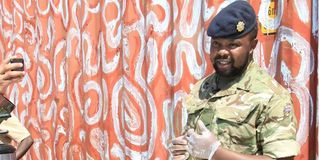Meet Gitau, British Rasta soldier who speaks ‘sheng’

British Army’s Lance Corporal George Gitau prepares to serve food to KDF and British soldiers after a joint training session at KDF School of Infantry in Isiolo on October 7.
What you need to know:
- For Lance Corporal Gitau, the culinary department is his area of expertise. But being an expert in the kitchen does not make him any less of a soldier.
Despite being a British soldier, he maintains that his interactions with his peers in his hometown remain the same.
He has been deployed to South Sudan, Cyprus, Germany, France, Poland and other UK nations.
At his hang-outs in Maringo, Nairobi, they call him Georges. In Queen Elizabeth’s army, he goes by Lance Corporal Gitau.
This is the story of George Gitau, 30, a Kenyan serving in the British Army, but who is also a chef and a Rastafarian.
His British Army uniform and his physique is synonymous with a soldier’s lifestyle, but it is his dreadlocks and eloquence in Kiswahili that sets him apart from other British soldiers.
He is particularly fond of ‘sheng’, Nairobi’s ever-changing urban slang.
“So mnataka nibonge Swa ama Ngoso? (Would you like me to speak in Swahili or English?),” Lance Corporal Gitau asks as we set up.
He particularly likes to speak in Swahili when interacting with Kenya Defence Forces (KDF) soldiers posted at the KDF School of Infantry in Isiolo, where we met him.
He is attached to the British Peace Support Team (Africa) and the Short Term Training Teams from the British Army that is participating in joint training with the KDF ahead of their deployment to Somalia under Amisom next year.
He has been in the British Army for 11 years, after enlisting in 2009. The British Army allows foreigners in Commonwealth countries to serve in the military, even without having been a resident of Britain previously.
Raised in Nairobi
“I was born and raised in Nairobi. I studied at Dr Kraft Primary School and Queen of Apostles High School. In 2008, I went to live with my brother in the UK, and a year later, I decided to enlist,” he said.
Unlike in Kenya, the British Army does not hold mass recruitment drives. It has set up career offices across the country where interested candidates apply.
Nevertheless, the selection process is as strict as the KDF one, if not stricter, with candidates open to pick different crafts available in the army.
For Lance Corporal Gitau, the culinary department is his area of expertise. But being an expert in the kitchen does not make him any less of a soldier.
“This is just a trade. This is the military and at the end of the day I am a soldier. Like everyone else in different trades, I have the military training and skills,” he says.
He has been deployed to South Sudan, Cyprus, Germany, France, Poland and other UK nations.
Despite being a British soldier, he maintains that his interactions with his peers in his hometown remain the same.
Openness to diversity
“When I am back home, I still hang out with my friends. They do not treat me differently. I grew up with most of them and they understand that this is just a job like any other,” he tells the Nation.
On his choice of hairstyle, he says that the openness to diversity by the British Army is one of the most accommodating aspects of the military.
“The British Army is very diverse on culture and accepts many people of different backgrounds. I am Rastafarian and that is why I have dreads. But the treatment and morals are the same for all,” he says.
The soldier has a message for Kenyan youth, urging them to keep an open mind in career choice by considering military work.
“Being in the military not only gives you a guaranteed wage but also exposure and a doorway to many opportunities. Besides, it is a way to serve your country. So, rather than stay idle, sign up,” he says.





